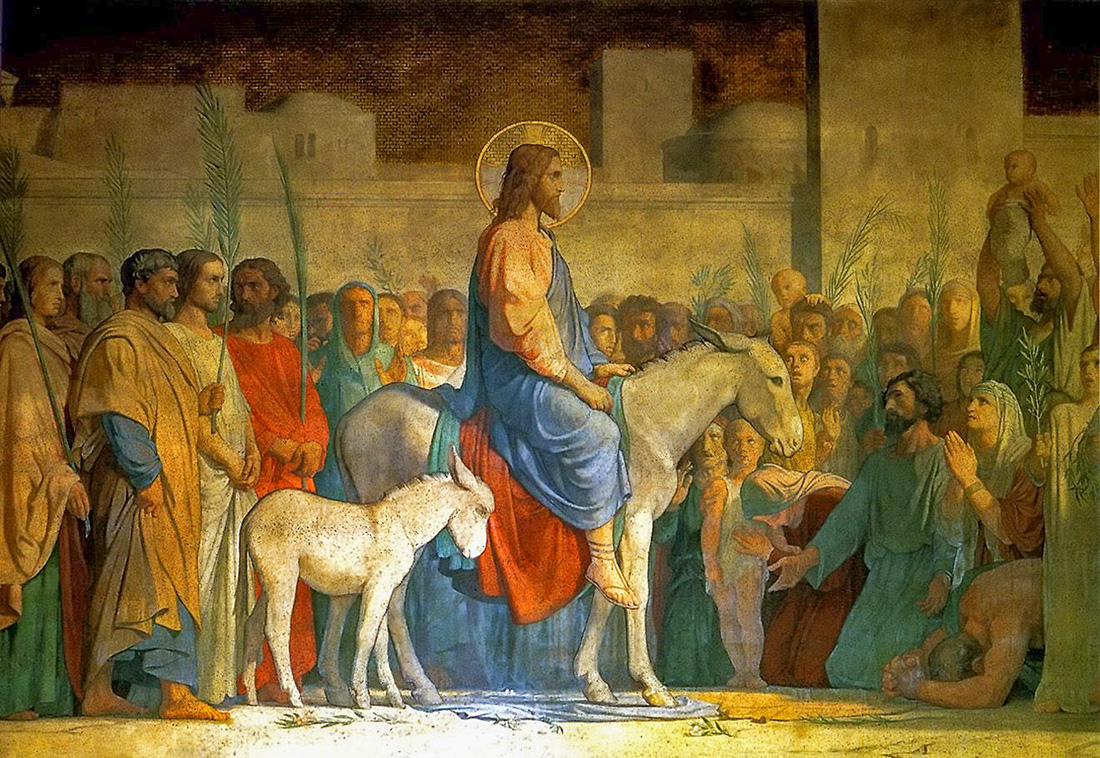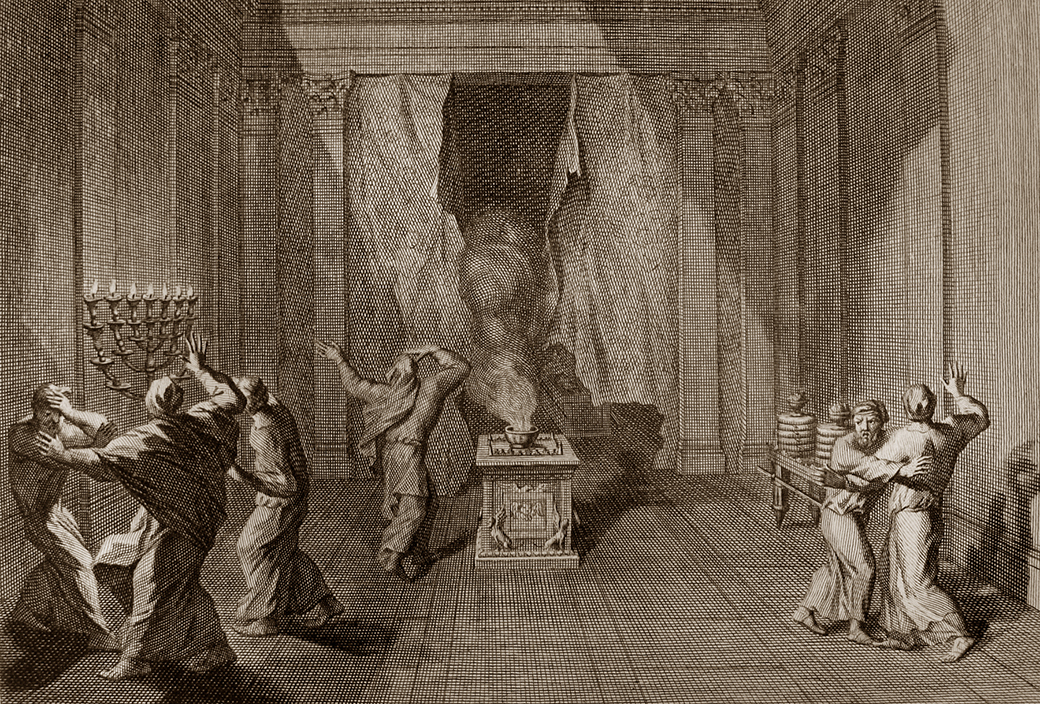Palm Sunday of the Passion of the Lord: (Procession with Palms: Mt 21:1-11), Isaiah 50: 4-7, Philippians 2:6-11, Matthew 26:14 – 17:66.
In the space of a blog post, how can we take in, much less reflect upon the events we celebrate on Palm Sunday? As disciples, we go from the highest of highs, seeing our Lord’s triumphant entrance to Jerusalem to the lowest of lows in betrayal, denial, and His death. Since I will reflect on the different aspects of the Lord’s Passion, Death, and Resurrection throughout Holy Week, I will use the space here to focus primarily on the readings that happen before the gospel.
We celebrate His triumphant entrance of Jerusalem by once again waving blessed palm branches, reading the passage from the gospel of St. Matthew, and singing “Hosanna to the Son of David!” Even in this time of quarantine during the coronavirus pandemic, we sing at home, we imagine the procession of Jesus as well as the procession of the faithful into the Kingdom, paving his way with palm branches. Let’s peer into these two important symbols: the palm branches and the cry, “Hosanna!”

Matthew tells us, “The very large crowd spread their cloaks on the road, while others cut branches from the trees and strewed them on the road.” The use of the palm branches — both in the original procession and in our continual processions each Palm Sunday — was first planted in the mouth of the psalmist by the Word of God. It comes from Psalm 118, A Song of Victory. Here are some important verses from that psalm:
With the Lord on my side I do not fear.
What can mortals do to me?
The Lord is on my side to help me;
I shall look in triumph on those who hate me. …
Open to me the gates of righteousness,
that I may enter through them
and give thanks to the Lord. …
The stone that the builders rejected
has become the chief cornerstone. …
Blessed is the one who comes in the name of the Lord.
We bless you from the house of the Lord.
The Lord is God,
and he has given us light.
Bind the festal procession with branches,
up to the horns of the altar.
This entire psalm is a prophecy of this moment of Christ’s entrance into Jerusalem. The final verse quoted above prophesies that the branches will line the procession “up to the horns of the altar,” for this is the entrance of a king and priest, coming to make a sacrifice to God at the altar. And, indeed, Christ, our high priest and king, does this, but not in the way imagined by the Jews. His altar is Golgatha, His sacrifice is His own Body and Blood. The Song of Victory exists both in triumph and in the pain and sorrow of His sacrifice. The Christian power is always surprising, always focused on God, always revealing the truth of transcending this world through self-sacrifice.

Next, Matthew tells us, “The crowds preceding him and those following kept crying out and saying: ‘Hosanna to the Son of David; blessed is the he who comes in the name of the Lord; hosanna in the highest.'” What is this Hosanna? Many of us might equate this with a triumphant shout, much like how we use “Alleluia!” It translates to something quite different, however. This phrase also comes from Psalm 118, verse 25: “Save us, we beseech you, O Lord! O Lord, we beseech you, give us success!” In Hebrew, this is “Anna, Yahweh, hoshi’a na! Anna, Yahweh, hasliah na!” So the Hebrew אנ העישוה (hoshi’a na), means “save us now, please!” It was originally a desperate plea to be saved. It is immediately followed in the psalm with “Blessed is the one who comes in the name of the Lord,” so we hear this plea of concern changing into one of joy. When the apostles tell us that the crowd shouted “Hosanna in the highest” and “Hosanna to the Son of David,” we should hear the urgent, Messianic cry applied to a specific person: Jesus Christ. We can also see how the belief in a Messiah and the sight of this wonder-worker Son of God in the flesh would inflect the desperate plea for saving with a hopeful joyousness. “Hosanna” in the Christian context is a cry that contains both that plea for help as well as the confidence and joy of the Resurrection that has burst upon the world.
Palm Sunday seems to resound with this double, somewhat contradictory knowledge. We need saving, we have been saved. Jesus rides in triumph, Jesus is condemned and killed in a shameful way. We wave palms in triumph, we kneel in sorrow. This important feast day, the bell tolling for the celebration of Holy Week, bursts at the seams with the mystery of the Christ Event. “the veil of the sanctuary was torn in two from top to bottom. The earth quaked, rocks were split, tombs were opened.” The world, and our feast day, cannot contain the mystery, nor can it break it into intelligible bits as if we can just celebrate the triumph without the sorrow. Or the sorrow without the triumph. They come together. This is Christianity.

St. Paul was graced with such incisive insight into the mystery of Christ and the Church. He tells us in today’s reading from the letter to the Philippians that Jesus did not attempt to “grasp” the equality He held with God, “Rather, he emptied himself, taking the form of a slave.” This is what we commemorate during Holy Week, the “emptying” of Himself from the praise He receives on his palm-lined entry into Jerusalem. This is a deliberate act — we have to see the praises being shouted in order to comprehend the true action of Christ. What kind of glory is this, to empty yourself of the praise, hopes, and adoration of your people? That’s not what a king does! And what does Jesus fill Himself with after becoming the slave? Sin that is not His. He descends into all of the sins in the Passion: betrayal by Judas, denial by Peter, hatred of the chief priests and Pharisees, the indifference of Pilate, torture of the soldiers, the mockery of the crowd. These, we are amply shown, are what He takes on instead of the triumph and earthly glory we associate with kings. He takes the fullness of sin of humanity and nails it, sacrifices it on the Cross with His own Body.
Here, in the depths of this never-before-imagined degradation and sacrifice, St. Paul shows us what he gains:
Because of this, God greatly exalted him
and bestowed on him the name
which is above every name,
that at the name of Jesus
every knee should bend,
of those in heaven and on earth and under the earth,
and every tongue confess that
Jesus Christ is Lord,
He gains God’s exaltation. This thing that humans only briefly experience at the oddest of times in our history, usually only when God chooses us and we somewhat stupidly and awkwardly do His will. Yet Jesus shows us how to do this intentionally, meaningfully and perfectly. It’s against all of our worldly instincts of raising ourselves above others. But Jesus gains the name “above every name,” that is, “Christ” and “Lord.” With His impossible and incredible acts of humility and carrying the burden of sin for humanity, “every knee should bend, of those in heaven and on earth and under the earth.” I love this image and this word choice. Every knee should bend! We, all of us who truly heed the reality of Christ’s entry into the world, simply cannot help but worship, adore, and pledge ourselves to Jesus Christ the Lord. Not just us! It’s beyond just us. It’s angels, demons, the dead, the “thrones and dominions.”
Against all of our notions of triumph, it turns out that this is glory. This is a king.
